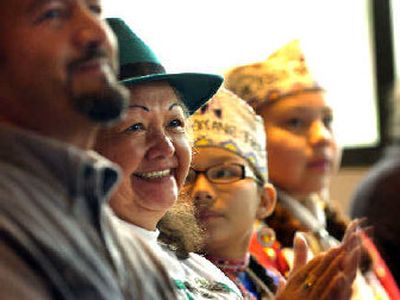Baseball team updates logo

At a time when sports teams across the nation are being criticized for their insensitivity to Native Americans, the Spokane Indians Baseball Club unveiled a new logo created in cooperation with the Spokane Tribe of Indians.
Club President Andy Billig said it could be the first time that a professional sports team has worked in conjunction with a local tribe to create a team identity.
“We wanted this new identity to show respect for the Spokane Tribe and honor the rich 104-year history of the team,” Billig said. “I think we accomplished both of our goals.”
The new primary logo incorporates tribal themes by including eagle feather accents around a retro “S” from the club’s 1970s heyday. A secondary logo, to be worn as a shoulder patch on home uniforms and some caps, includes the words “Spokane Indians Baseball Club” written in the tribe’s Salish dialect.
Far from protesting the use of a sacred symbol in Spokane tribal culture, the tribe congratulated the baseball club for its respect in consulting with the tribe’s culture committee, which unanimously approved the designs.
“By taking the responsibility of consulting with the Spokane Tribe of Indians we hope this will become a leading example for other companies and sporting groups,” Richard Sherwood, chairman of the Spokane Tribal Business Council wrote to Spokane Indians Baseball in the fall.
The issue was not brought before the general membership of the Spokane Tribe, council member Gerald Nicodemus said Wednesday. However, he said, the consensus was in favor of the club continuing to use the “Indians” nickname.
The club also consulted with other area tribes through the Upper Columbia United Tribes, which represents the Spokane, Coeur d’Alene, Kalispel, Kootenai and Confederated Tribes of the Colville Reservation, Billig said.
But while no local native voices were raised against the Spokane Indians’ new team image on Wednesday, a national native activist group took exception.
“Any compromise short of Spokane dropping ‘Indian’ and any identifiable (native) logos would be unacceptable to us and should be unacceptable to the Spokane Nation,” said Vernon Bellecourt, president of the National Coalition on Racism in Sports and Media and spokesman for the American Indian Movement.
Bellecourt, an Anishinabe-Ojibwe who has led or participated in numerous Native rights demonstrations, said amateur and professional sports clubs perpetuating racist stereotypes “usually shop around to find tribes that will compromise.”
He cited the example of the Florida State Seminoles that won the support of the Seminole Tribe of Florida but not that of the majority of Seminole people, including those whose ancestors were forcibly relocated to Oklahoma by the U.S. government.
“Our detractors always say ‘we are honoring you,’ ” Bellecourt said. “It’s not an honor. In whose honor, we have to ask. Beginning with the pilgrims at Plymouth Rock, about 16 million of us were wiped out, including whole villages in Washington, where Native girls were sold on the auction block as sex slaves in mining towns and young boys were made slaves on ranches.”
The National Collegiate Athletic Association has banned the use of American Indian symbols and mascots participating in NCAA postseason tournaments.
The action initially applied to 18 colleges and universities, but the NCAA dropped the restrictions on three teams after the Seminole Tribe supported Florida State, the Utes backed the University of Utah, and the Chippewas vouched for Central Michigan University.
Bellecourt criticized such endorsements by “fort Indians” willing to compromise on this issue much like segregationists were able to find a few African Americans to support their cause in the early years of the civil rights movement.
There is some evidence, however, that Native American activists may be out of touch with Native Americans on this issue. Patrons of Wellpinit School on the Spokane Reservation have long resisted efforts to rename their “Redskins” team.
A March 2001 Sports Illustrated poll asked Native Americans whether high school or college teams should stop using native mascots, and 81 percent said no. That number rose to 83 percent when Native American respondents were asked the same question about professional teams.
Scholars have since challenged the SI poll on technical, as well as moral, grounds.
Officials of both the Spokane Indians and Spokane Tribe dismissed criticisms such as Bellecourt’s when the new club logo was unveiled Wednesday in front of a crowd of nearly 200 people, including native drummers from Wellpinit School, at the Northwest Museum of Arts and Culture.
The club is owned by Brett Sports and Entertainment, which also owns the Spokane Chiefs, a minor league hockey team.
Spokane tribal council member Matt Wynn said the club “really showed respect” for the tribe by asking for tribal input. Wynn said he’s often asked whether he plays baseball when he tells people he is a Spokane Indian and is not the least embarrassed by it.
Billig said he would be more concerned if criticism came from local tribes rather than national activists who have never been to an Indians game to notice that the club does not use a native mascot or participate in “war chants” used by other teams with Indian mascots and nicknames.
“If there is anybody in the Spokane community that has an issue with our team name or logo, our team would like to have a dialogue with them,” Billig said. “If we had not gotten their approval, we would not have done this.”